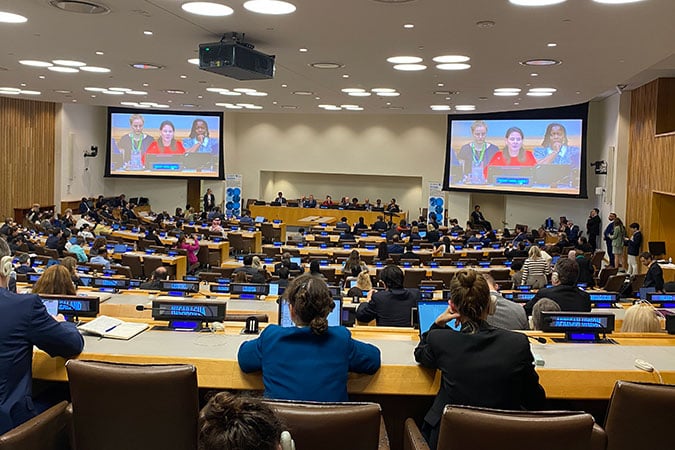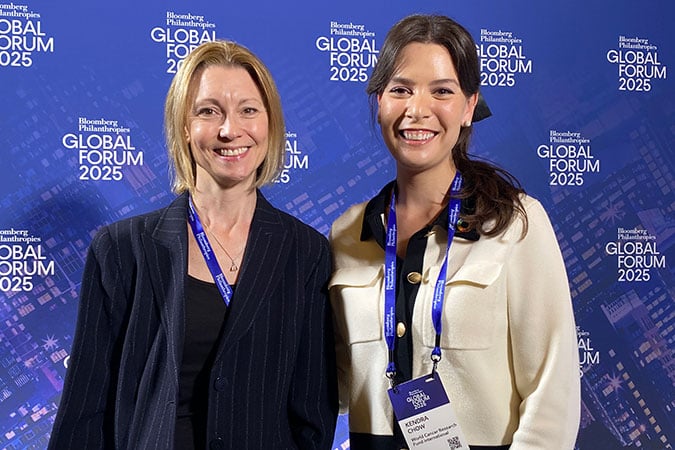Why prevention must lead the way after the fourth UN High-Level Meeting on NCDs and mental health

Setting the Global Direction
The Road to the 4th High-Level Meeting (HLM4) on the Prevention and Control of Non-communicable Diseases (NCDs) and the Promotion of Mental Health has been a long one.
Kendra Chow (Senior Policy & Public Affairs Manager) and Dr Helen Croker (Assistant Director of Science and Policy) were in New York – alongside government officials and policymakers from around the world, civil society and lived-experience advocates – joined in a busy week of side events and bilateral meetings leading up to the HLM4 at UN Headquarters on 25 September in New York.
Amid a bustling and busy New York scene, the week’s events offered a rare opportunity for governments to set the global course to address NCDs and (for the first time) mental health.
The Political Declaration – a document that has been negotiated by Member States from May through September – was set to be adopted that day. The Declaration is a critical tool that will shape global health priorities until 2030 – a crucial window for progress on cancer and other NCDs.
And although, in the end, it was not officially adopted on the day of the HLM4 (due to concerns raised by a small number of Member States), the number of Member States that did voice their support for the Declaration’s contents and commitments indicates that it is likely to approved in the General Assembly after a voting process.
We have been actively engaged along the entire road to the HLM4 – participating in the multistakeholder hearing in May, meeting with Member State Missions in New York and Geneva, and emphasizing that prevention is the most effective and equitable way to reduce cancer and NCD burden (read our High-level Meeting advocacy brief).
Cancer gains, but gaps remain
There is welcome recognition in the Declaration that cancer is a global priority, with an emphasis on research, evidence and innovation. This is a win for us because we repeatedly pressed Member States for the urgency of cancer to be included in the final Declaration, and these gains in visibility matter.
One in 7 deaths worldwide is caused by cancer. The Declaration includes specific commitments on reducing cases of cervical, childhood and liver cancer, which is meaningful progress.
The need for prevention
The Declaration also includes an ambitious target: by 2030, at least 80% of countries should have operational, multisectoral NCD and mental health strategies in place. This milestone matters, and WCRF International welcomes it as a step forward. But for these strategies to truly succeed, they must be rooted in prevention. Without embedding prevention, policies risk becoming too heavily focused on treatment-focused, missing the opportunity to save lives and reduce costs through avoiding disease in the first place.
Evidence shows that 40% of cancers are preventable by acting on key risk factors—unhealthy diets, alcohol, tobacco, obesity, and air pollution. The Declaration acknowledges these risks but stops short of committing to strong preventive measures.
Alcohol is one clear example: the text refers only to “harmful use”, but we know there is no safe level of consumption. Stronger, clearer language is needed if prevention is to drive meaningful change.
The case for health taxes
Health taxes are a proven part of the solution. The evidence is clear: fiscal measures on tobacco, alcohol and sugar-sweetened beverages are among the most effective public health tools available. They deliver health gains, generate economic returns, and are among the WHO best buys (and WHO EURO’s “quick buys”).
Despite this overwhelming evidence, the Declaration fails to deliver firm commitments on health taxes, reflecting the political sensitivity of fiscal measures. WCRF International believes finance ministries, alongside other sectors, must show leadership by adopting prevention-focused fiscal policy.
Tackling political and commercial pressures
The cautious language in the Declaration also reflects our current global political climate. Evidence-based measures such as health taxes and alcohol regulation faced strong pushback during negotiations, amplified by lobbying from unhealthy commodity industries that distort science and confuse the public.
This weakens trust in health policy and emboldens opposition, making it harder for governments to commit to bold action.
Conflicts of interest remain another challenge. Industries that encourage people to buy and use unhealthy products should not shape health policy.
Without institutional safeguards, prevention risks being sidelined in favour of commercial. We continue to call for clear protections to ensure that public health, not profit, drives decision-making.

Dr Helen Croker and Kendra Chow at the UN HLM High Level Meeting in New York
Civil Society’s role
Civil society participation is another area where commitments could have been stronger. People living with NCDs and the organisations that represent them should be central to governance and accountability. Yet compared with previous Political Declarations, this text weakens those commitments. For implementation to succeed, participation must be meaningful, resourced, and embedded in national coordination mechanisms.
Building from here
The NCD burden is urgent and rising, but the solutions are within reach. Prevention is non-negotiable. Health taxes, alcohol control acknowledging no safe level of consumption, and healthier food environments must sit at the centre of national responses. Tackling misinformation, industry interference, and weak implementation is just as important as designing strong policy.
Taken together, these dynamics highlight why the Declaration must be seen as a floor, not a ceiling. Emphasis on the cancer burden and the target for national plans provide a platform to build upon, but prevention must be prioritised if we are to make real progress.
Governments will need political courage, strong leadership, and cross-sector collaboration to deliver on their promises.
We will continue to advocate for prevention as the most effective and equitable approach to reducing cancer and NCDs, and are ready to work with UN agencies, Member States, and partners such as the NCD Alliance and UICC to translate the Declaration’s commitments into national action.
> Read our statement prepared for the UN High-level Meeting on NCDs and mental health



